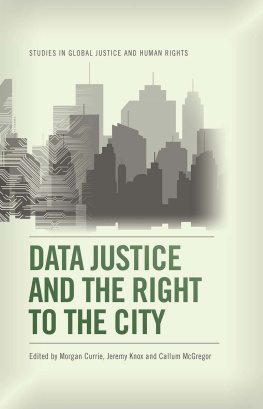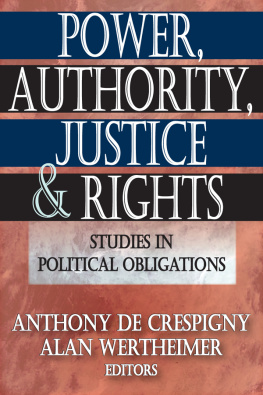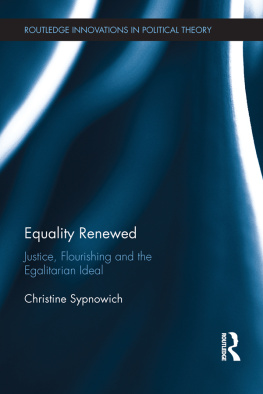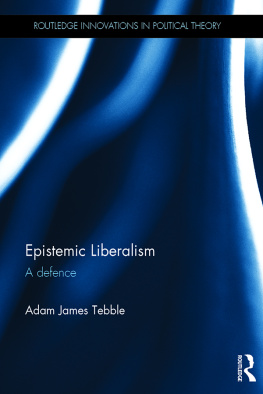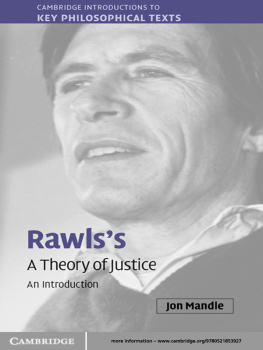About the Author
Kacey Brooke Warren is a Lecturer of philosophy at the University of Colorado at Boulder. Warren specializes in social and political philosophy, feminist philosophy, and philosophy of disability. She also has interests in bioethics, philosophy of law, and philosophy of race.
Acknowledgments
I owe my most profound gratitude to Alison Jaggar. I am deeply indebted to Alison for the countless drafts of this work she read early on, for the precision with which she criticized them, and for the guidance she offered toward restructuring and clarifying the ideas presented in them. I am so fortunate to have had her continued encouragement and support in seeing the project through to the completion of this book. In addition, I would like to extend a special thanks to Eva Kittay for her invaluable feedback on a much earlier version of this work, as well as to the reviewer of the manuscript for the very kind and insightful suggestions. Finally, I would like to thank those colleagues (Chelsea Haramia, Jen Kling, Audra King and Marlisa Moschella), family members (especially Anne), and friends whose insights and encouragement have been invaluable and will not be forgotten. I am particularly indebted to Chelsea Haramia for her criticisms and copy-editing assistance.
Bibliography
American Association on Intellectual and Developmental Disabilities. Frequently Asked Questions on Intellectual Disability and the AAIDD definition AAIDD. Retrieved from: http://www.aaidd.org/media/PDFs/AAIDDFAQonID.pdf. (Accessed on February 15, 2012).
--FAQ on Intellectual Disability. AAIDD. Retrieved from: http://www.aaidd.org/content_104.cfm?navID=22. (Accessed on March 15, 2012).
Americans With Disabilities Act of 1990 as Amended. Retrieved from: http://www.ada.gov/pubs/ada.htm. (Accessed on August 12, 2008).
Anderson, Elizabeth. Whats the Point of Equality, Ethics 109, no. 2 (Jan. 1999): 287337.
--Justifying the Capabilities Approach to Justice. In Measuring Justice: Primary Goods or Capabilities, edited by Harry Brighouse and Ingrid Robeyns, 81100. New York: Cambridge University Press, 2010.
Antony, Louise M. Naturalized Epistemology, Morality and the Real World, Canadian Journal of Philosophy 26 (2000): 103137.
Arneil, Barbare. Disability, Self Image, and Modern Political Thought, Political Theory 37, no. 2 (2009): 218242.
Ashford, Elizabeth, and Tim Mulgan. Contractualism. The Stanford Encyclopedia of Philosophy, edited by Edward N. Zalta. Winter 2009 Edition. Retrieved from: http://plato.stanford.edu/archives/win2009/entries/contractualism/.
Baier, Annette. Trust and Antitrust, Ethics 96, no. 2 (1986): 23160.
Bailey Alison. Reconceiving Surrogacy: Toward a Reproductive Justice Account of Indian Surrogacy. Hypatia 26, no. 4 (Fall 2011): 715741.
Bauman, L.; H. Dirksen; Jennifer Drake. Silence Is Not Without Voice: Including Deaf Culture within Multicultural Curricula. In The Disability Studies Reader, edited by Lennard J. Davis, 307311. New York: Routledge, 1997.
Baynton, Douglas. A Silent Exile on this Earth: The Metaphoric Construction of Deafness in the Nineteenth Century. In The Disability Studies Reader, edited by Lennard J. Davis, 128150. New York: Routledge, 1997.
BBC News. Einstein and Newton had autism, BBC News, April 30, 2003. Retrieved from: http://newsvote.bbc.co.uk/mpaps/pagetools/print/news.bbc.co.uk/2/hi/health/2988647.stm.
Becker, Laurence. Reciprocity, Justice, and Disability, Ethics 116, no.1 (October, 2005): 939.
Benhabib, Seyla. Situating the Self. New York: Routledge, 1992.
Brub, Michael. Equality, Freedom, and/or Justice for All: A Response to Martha Nussbaum. In Cognitive Disability and its Challenge to Moral Philosophy, edited by Licia Carlson and Eva Kittay, 97109. Wiley-Blackwell, 2010.
Brault, Matthew W. Americans with Disabilities Act: 2005. Retrieved from: http://www.census.gov/prod/2008pubs/p70-117.pdf. (Accessed on January 5, 2012).
Brighouse, Harry. Can Justice as Fairness Accommodate the Disabled? Social Theory and Practice 27 no. 4 (2001): 537560.
Brosco, Jeffrey P. MD. The Limits of the Medical Model: Historical Epidemiology of Intellectual Disability in the United States. In Cognitive Disability and Its Challenge to Moral Philosophy, edited by Licia Carlson and Eva Kittay, 2754. Wiley- Blackwell, 2010.
Buchanan, Allen, Dan W. Brock, Norman Daniels, and Daniel Wilker. From Chance to Choice: Genetics and Justice. New York: Cambridge University Press, 2000).
Carey, Allison C. Beyond the Medical Model: a Reconsideration of Feeblemindeness, Citizenship and Eugenic Restrictions, Disability and Society 18, no. 4 (2003): 411430.
Carlson, Licia. Cognitive Ableism and Disability Studies: Feminist Reflections on the History of Mental Retardation, Hypatia 16, no.4 (2001): 124146.
--Philosophers of Intellectual Disability. In Cognitive Disability and its Challenge to Moral Philosophy, edited by Licia Carlson and Eva Kittay, 315329. Wiley-Blackwell, 2010
--The Faces of Intellectual Disability. Bloomington, IN: Indiana University Press, 2010.
Center for Disease Control. Autism Spectrum Disorders: Data and Statistics. Retrieved from: http://www.cdc.gov/ncbddd/autism/data.html. (Accessed on May 13, 2010).
Cohen, David. I Am an Anthropologist From Mars, The Guardian, October 24, 2005. Retrieved from: http:www.guardian.co.uk/education/2005/highereducationprofile.academicexperts.
Coleman, Lerita M. Stigma: An Enigma Demystified In The Disability Studies Reader, edited by Lennard J. Davis, 928. New York: Routledge, 1997.
Constant, Benjamen. The Liberty of the Ancients Compared with that of the Moderns. 1816. Retrieved from: http://oll.libertyfund.org/title/2251. (Accessed on July 8, 2014).
Cope, David. Disability Law and Your Classroom, Academe (NovemberDecember, 2005): 3739.
Corker, Miriam. Sensing Disability, Hypatia 16, no. 4 (Fall 2001): 3452.
DAgostino, Fred. Contemporary Approaches to the Social Contract. The Stanford Encyclopedia of Philosophy, edited by Edward N. Zalta. Retrieved from: http://plato.stanford.edu/archives/win/2011/entries/justification/public. (Accessed on June 12, 2014).
Daniels, Norman. Wide Reflective Equilibrium and Theory Acceptance, Ethics 76, no. 5 (1979): 256282.
--Reflective Equilibrium and Archemedian Points. Canadian Journal of Philosophy 10, no. 1 (March 1980), 83100.
--Health-Care Needs and Distributive Justice, Philosophy and Public Affairs 10, no. 2 (Spring 1981): 146179.
--Equality of What: Welfare, Resources or Capabilities?, Philosophy and Phenomenological Research 50, Supplement. (Autumn, 1990): 273296.
--Reflective Equilibrium. The Stanford Encyclopedia of Philosophy 2011, edited by Edward N. Zalta. Retrieved from: http://plato.stanford.edu/archives/win2011/entries/reflective-equilibrium/. (Accessed on February 17, 2011).
Davis, Lennard J. Constructing Normalcy. In The Disability Studies Reader, edited by Lennard J. Davis, 928. New York: Routledge, 1997.
Devlin, Richard, and Dianne Pothier. Critical Disability Theory: Essays in Philosophy, Policy, and Law. Vancouver: UCB Press, 2006.
Du Bois, W. E. B. (1903). Of Our Spiritual Strivings. The Souls of Black Folk. Chicago: A.C. McClurg & Co. http://www.bartleby.com/114/. (Accessed on December 30, 2011).
Dworkin, Ronald. The Original Position, The Chicago Law Review 40 (1972/1973): 500533.
Edwards, Martha L. Deaf and Dumb in Ancient Greece, In The Disability Studies Reader, edited by Lennard J. Davis, 2951. New York: Routledge, 1997.


